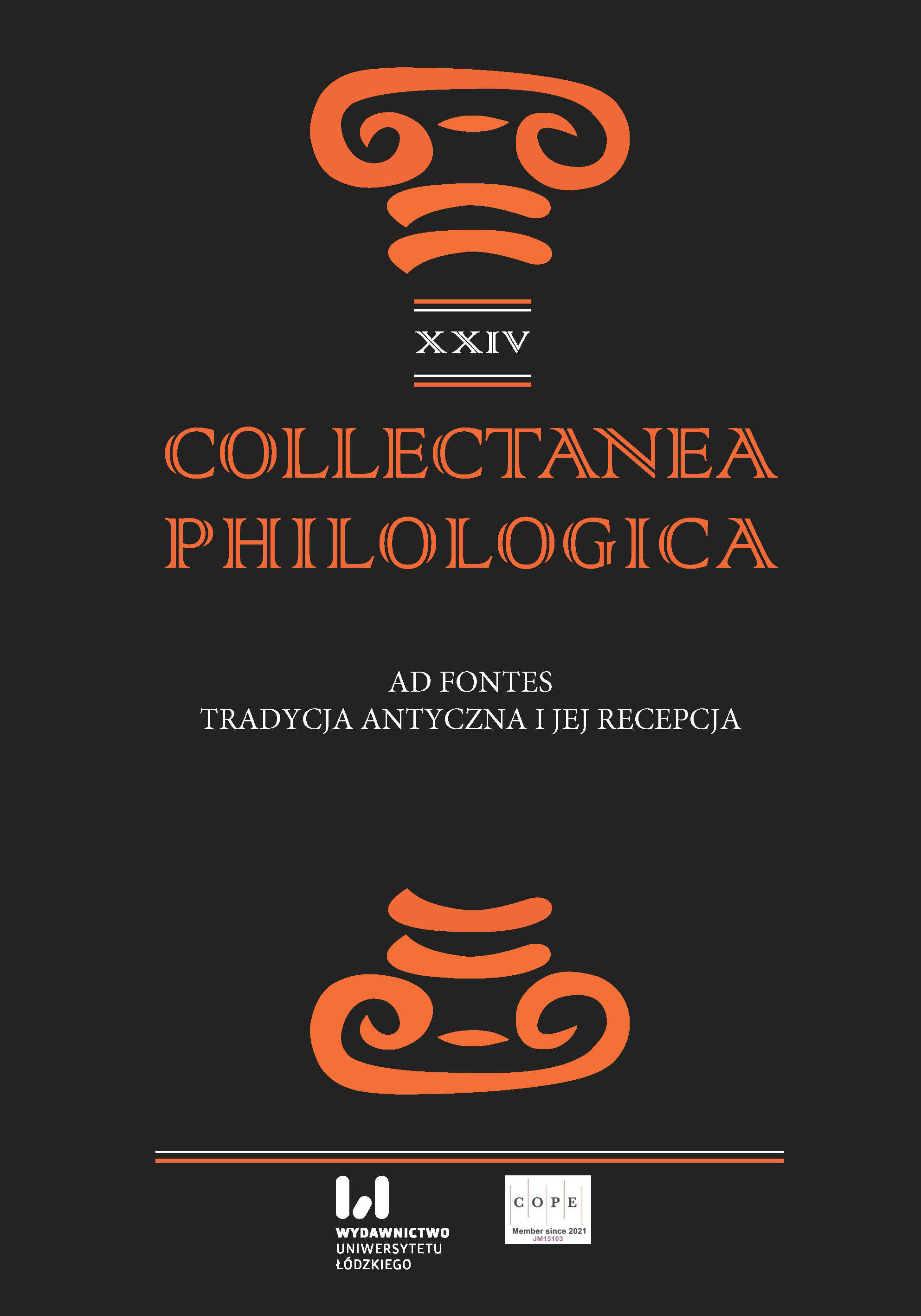The Mythical Underworlds of Francis Stevens and Daphne du Maurier
DOI:
https://doi.org/10.18778/1733-0319.24.12Słowa kluczowe:
mit, podziemia, science fiction, Francis Stevens, Daphne du MaurierAbstrakt
This article analyses two stories by women writers (The Heads of Cerberus by Francis Stevens (1952) and The Breakthrough by Daphne du Maurier (1964)), which could both be considered as belonging to the genre of science fiction. These stories do not follow the ‘canonical’ or more popular type of underworld narrative, especially the idea of the katabasis or descent to the underworld and the encounter with the dead, a motif which has often been present in Western culture since classical antiquity and has generated numerous narratives. Rather, they evoke the classical myth of the underworld through the use of certain names (such as Charon and Cerberus) as well as exploring other concepts which coincide with ancient Greek accounts of the topography and inhabitants of the world of the dead, the realm ruled over by Hades.
Bibliografia
Aguirre, M. (2014). Caracterización y representación de los fantasmas en la antigua Grecia in Fantasmas, aparecidos y muertos sin descanso. In: M. Aguirre, C. Delgado, A. González-Rivas (ed.). Madrid: Abada. 55–65.
Google Scholar
Alderman, N. (2019). “Introduction” to Francis Stevens, The Heads of Cerberus. New York: Modern Library https://doi.org/10.1515/9781618110558-001
Google Scholar
DOI: https://doi.org/10.1515/9781618110558-001
Armitt, L. (ed.). (1991). Where no man has gone before: Women and science fiction. London–New York: Routledge.
Google Scholar
Bleiler, E.F. (1990). Science Fiction. The Early Years. Kent, Ohio: Kent State University Press.
Google Scholar
Bost-Fiévet, M., Provini, S. (2014). Sur des pensers anciens faisons des mondes nouveaux. In: M. Bost-Fiévet, S. Provini (ed.). L’Antiquité dans l’imaginaire contemporain. Fantasy, science-fiction, fantastique. Paris: Classiques Garnier. 273–283.
Google Scholar
Brayfield, C. (2007). The House of the Strand. In: The Daphne du Maurier Companion. London: Virago Press. 210–216.
Google Scholar
Bremmer, J. (1983). The Early Greek Concept of the Soul. Princeton: Princeton University Press https://doi.org/10.1515/9780691219356
Google Scholar
DOI: https://doi.org/10.1515/9780691219356
Cornillon, C. (2014). Moi, Thésée, je decouvrirai les chemins de l’espace. In: M. Bost-Fiévet, S. Provini (eds.). L’Antiquité dans l’imaginaire contemporain. Fantasy, science-fiction, fantastique. Paris: Classiques Garnier. 175–186.
Google Scholar
Du Maurier, D. (2006). The Breakthrough in Don’t Look Now and Other Stories, London: Penguin.
Google Scholar
Ekroth, G., Nilsson, I. (eds.). (2018). Round Trip to Hades in the Eastern Mediterranean Tradition: Visits to the Underworld from Antiquity to Byzantium. Leiden: Brill https://doi.org/10.1163/9789004375963
Google Scholar
DOI: https://doi.org/10.1163/9789004375963
Fletcher, J. (2019). Myths of the Underworld in Contemporary Culture. Oxford: Oxford University Press https://doi.org/10.1093/oso/9780198767091.001.0001
Google Scholar
DOI: https://doi.org/10.1093/oso/9780198767091.001.0001
Hall, E. (2012). The Return of Ulysses, London: I.B.Tauris.
Google Scholar
Heeley, M. (2007). Christianity versus Paganism: Daphne du Maurier’s Divided Mind. In: H. Taylor (ed.). The Daphne du Maurier Companion. London: Virago Press. 122–132.
Google Scholar
Hietala Lilja, J. (2020). Anticipation, Uncertainty and Concern for Characters: Suspense in Daphne du Maurier’s Short- Story Collection Don’t Look Now. MA Thesis, Helsinki: Helsingin yliopisto.
Google Scholar
Hodges, S. (2007). Editing Daphne du Maurier. In: H. Taylor (ed.). The Daphne du Maurier Companion. London: Virago Press. 25–43.
Google Scholar
Horner, A., Zlosnik, S. (1998). Daphne du Maurier. Writing, Identity and the Gothic Imagination. London: McMillan Press https://doi.org/10.1057/9780230378773
Google Scholar
DOI: https://doi.org/10.1057/9780230378773
Keen, A. (2015). Mr. Lucian in Suburbia: Links Between the True History and The First Man in the Moon. In: B.M. Rogers, B.E. Stevens (eds.). Classical Traditions in Science Fiction. Oxford: Oxford University Press. 105–120.
Google Scholar
Kogel, D., Schaefer, I. (2011). The Doppelgӓnger motif in Science-Fiction film. In: S. Georgi, K. Loock (eds.). Of Body Snatchers and Cyberpunks: Student Essays on American Science-Fiction. Gӧttingen: Universitӓt Gӧttingen. 125–141 https://doi.org/10.17875/gup2021-1678
Google Scholar
DOI: https://doi.org/10.17875/gup2021-1678
Merrick, H. (2003). Gender in Science Fiction. In: E. James, S. Mendelsohn (eds.). The Cambridge Companion to Science Fiction. Cambridge: Cambridge University Press. 241–252 https://doi.org/10.1017/CCOL0521816262.019
Google Scholar
DOI: https://doi.org/10.1017/CCOL0521816262.019
Ogden, D. (2001). Greek and Roman Necromancy. Princeton: Princeton University Press https://doi.org/10.1515/9780691207063
Google Scholar
DOI: https://doi.org/10.1515/9780691207063
Provini, S., Bost-Fiévet, M. (2014). L’antiquité gréco-latine dans l’imaginaire contemporain, Introduction générale. In: M. Bost-Fiévet, S. Provini (eds.). L’Antiquité dans l’imaginaire contemporain. Fantasy, science-fiction, fantastique. Paris: Classiques Garnier. 15–34.
Google Scholar
Roberts, A. (2006). The History of Science Fiction. Basingstoke: Palgrave Mcmillan https://doi.org/10.1057/9780230554658
Google Scholar
DOI: https://doi.org/10.1057/9780230554658
Rogers, B.M., Stevens, B.E. (2015). Classical Traditions in Science Fiction. Oxford: Oxford University Press.
Google Scholar
Seed, D. (2011). Science Fiction. A Very Short Introduction. Oxford: Oxford University Press https://doi.org/10.1093/actrade/9780199557455.001.0001
Google Scholar
DOI: https://doi.org/10.1093/actrade/9780199557455.001.0001
Simonis, A. (2014). Voyages Mythiques et passages aux enfers. In: M. Bost-Fiévet, S. Provini (eds.). L’Antiquité dans l’imaginaire contemporain. Fantasy, science-fiction, fantastique. Paris: Classiques Garnier. 241–252.
Google Scholar
Stableford, B. (2003). Science Fiction before the genre. In: E. James, S. Mendelsohn (eds.). The Cambridge Companion to Science Fiction. Cambridge: Cambridge University Press. 15–31 https://doi.org/10.1017/CCOL0521816262.002
Google Scholar
DOI: https://doi.org/10.1017/CCOL0521816262.002
Stevens, F. (2019). The Heads of Cerberus. New York: The Modern Library.
Google Scholar
Pobrania
Opublikowane
Jak cytować
Numer
Dział
Licencja

Utwór dostępny jest na licencji Creative Commons Uznanie autorstwa – Użycie niekomercyjne – Bez utworów zależnych 4.0 Międzynarodowe.












